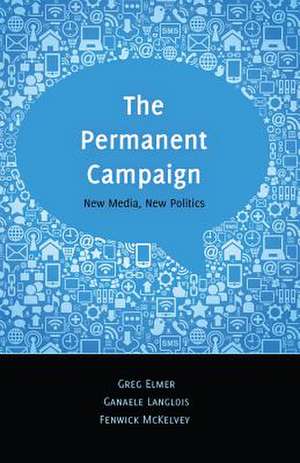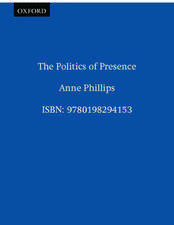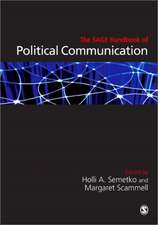The Permanent Campaign: Digital Formations (Paperback), cartea 81
Autor Greg Elmer, Ganaele Langlois, Fenwick McKelveyen Limba Engleză Paperback – 5 noi 2012
| Toate formatele și edițiile | Preț | Express |
|---|---|---|
| Paperback (1) | 376.91 lei 43-57 zile | |
| Peter Lang Gmbh, Internationaler Verlag Der W – 5 noi 2012 | 376.91 lei 43-57 zile | |
| Hardback (1) | 783.41 lei 38-44 zile | |
| Peter Lang Gmbh, Internationaler Verlag Der W – 20 noi 2012 | 783.41 lei 38-44 zile |
Din seria Digital Formations (Paperback)
-
 Preț: 364.56 lei
Preț: 364.56 lei -
 Preț: 246.77 lei
Preț: 246.77 lei -
 Preț: 240.88 lei
Preț: 240.88 lei -
 Preț: 366.31 lei
Preț: 366.31 lei -
 Preț: 179.90 lei
Preț: 179.90 lei -
 Preț: 394.05 lei
Preț: 394.05 lei -
 Preț: 374.03 lei
Preț: 374.03 lei -
 Preț: 271.28 lei
Preț: 271.28 lei - 20%
 Preț: 335.16 lei
Preț: 335.16 lei -
 Preț: 510.78 lei
Preț: 510.78 lei -
 Preț: 339.53 lei
Preț: 339.53 lei -
 Preț: 331.03 lei
Preț: 331.03 lei -
 Preț: 332.02 lei
Preț: 332.02 lei - 23%
 Preț: 454.43 lei
Preț: 454.43 lei - 20%
 Preț: 304.59 lei
Preț: 304.59 lei -
 Preț: 369.37 lei
Preț: 369.37 lei -
 Preț: 252.61 lei
Preț: 252.61 lei - 20%
 Preț: 317.96 lei
Preț: 317.96 lei -
 Preț: 327.00 lei
Preț: 327.00 lei -
 Preț: 370.72 lei
Preț: 370.72 lei -
 Preț: 256.00 lei
Preț: 256.00 lei -
 Preț: 363.02 lei
Preț: 363.02 lei -
 Preț: 344.32 lei
Preț: 344.32 lei -
 Preț: 248.67 lei
Preț: 248.67 lei -
 Preț: 369.75 lei
Preț: 369.75 lei -
 Preț: 260.55 lei
Preț: 260.55 lei -
 Preț: 368.42 lei
Preț: 368.42 lei -
 Preț: 282.63 lei
Preț: 282.63 lei - 20%
 Preț: 350.18 lei
Preț: 350.18 lei -
 Preț: 418.31 lei
Preț: 418.31 lei -
 Preț: 364.95 lei
Preț: 364.95 lei -
 Preț: 258.98 lei
Preț: 258.98 lei -
 Preț: 355.71 lei
Preț: 355.71 lei -
 Preț: 248.20 lei
Preț: 248.20 lei -
 Preț: 378.82 lei
Preț: 378.82 lei -
 Preț: 387.86 lei
Preț: 387.86 lei -
 Preț: 381.91 lei
Preț: 381.91 lei -
 Preț: 400.03 lei
Preț: 400.03 lei -
 Preț: 352.62 lei
Preț: 352.62 lei -
 Preț: 380.73 lei
Preț: 380.73 lei -
 Preț: 382.89 lei
Preț: 382.89 lei -
 Preț: 375.94 lei
Preț: 375.94 lei -
 Preț: 396.17 lei
Preț: 396.17 lei -
 Preț: 385.35 lei
Preț: 385.35 lei -
 Preț: 393.07 lei
Preț: 393.07 lei -
 Preț: 379.96 lei
Preț: 379.96 lei -
 Preț: 374.96 lei
Preț: 374.96 lei -
 Preț: 353.60 lei
Preț: 353.60 lei -
 Preț: 424.08 lei
Preț: 424.08 lei
Preț: 376.91 lei
Nou
Puncte Express: 565
Preț estimativ în valută:
72.12€ • 75.50$ • 59.68£
72.12€ • 75.50$ • 59.68£
Carte tipărită la comandă
Livrare economică 07-21 aprilie
Preluare comenzi: 021 569.72.76
Specificații
ISBN-13: 9781433115936
ISBN-10: 143311593X
Pagini: 144
Dimensiuni: 147 x 224 x 15 mm
Greutate: 0.18 kg
Ediția:Nouă
Editura: Peter Lang Gmbh, Internationaler Verlag Der W
Seria Digital Formations (Paperback)
ISBN-10: 143311593X
Pagini: 144
Dimensiuni: 147 x 224 x 15 mm
Greutate: 0.18 kg
Ediția:Nouă
Editura: Peter Lang Gmbh, Internationaler Verlag Der W
Seria Digital Formations (Paperback)
Notă biografică
Greg Elmer (PhD, University of Massachusetts) is Bell Globemedia Research Chair, Associate Professor of Radio TV Arts, and Director of the Infoscape Research Lab at Ryerson University in Toronto, Canada. He is coauthor of Infrastructure Critical (with A. Renzi, 2012), Preempting Dissent (with A. Opel, 2008), and author of Profiling Machines: Mapping the Personal Information Economy (2004). Ganaele Langlois (PhD, York University) is Assistant Professor in the Communication Program at the University of Ontario Institute of Technology and Associate Director at the Infoscape Centre for the Study of Social Media. Her research focuses on the intersection between software, capitalism, subjectivity, and language, and is influenced by software studies and autonomist theories. Her articles have been published in Culture Machine, Fibreculture, New Media & Society, and the Canadian Journal of Communication. Fenwick McKelvey (PhD, York-Ryerson University) is Postdoctoral Fellow in the Department of Communication at the University of Washington. His research questions the relationship between communication and control in digital media. He explores this relationship through studies of Internet routing algorithms and, more recently, political campaign management software.
Recenzii
'The Permanent Campaign' offers an important and provocative new perspective on the changes occurring within politics as it enters the Digital Age. Through a series of innovative analyses of popular online social spaces such as Facebook, Twitter, and the blogosphere the authors show how the Web 2.0 environment creates a more networked, transient and 'moment'- based campaign environment that fundamentally challenges parties' and candidates' ability to maintain a coherent, durable and visible presence. The result is a new understanding of the notion of the 'permanent campaign' that moves it beyond the standard temporal approach adopted within political science to a more ubiquitous social and spatially embedded concept, in which 'flux' itself becomes the new permanence. (Rachel Gibson, University of Manchester)










